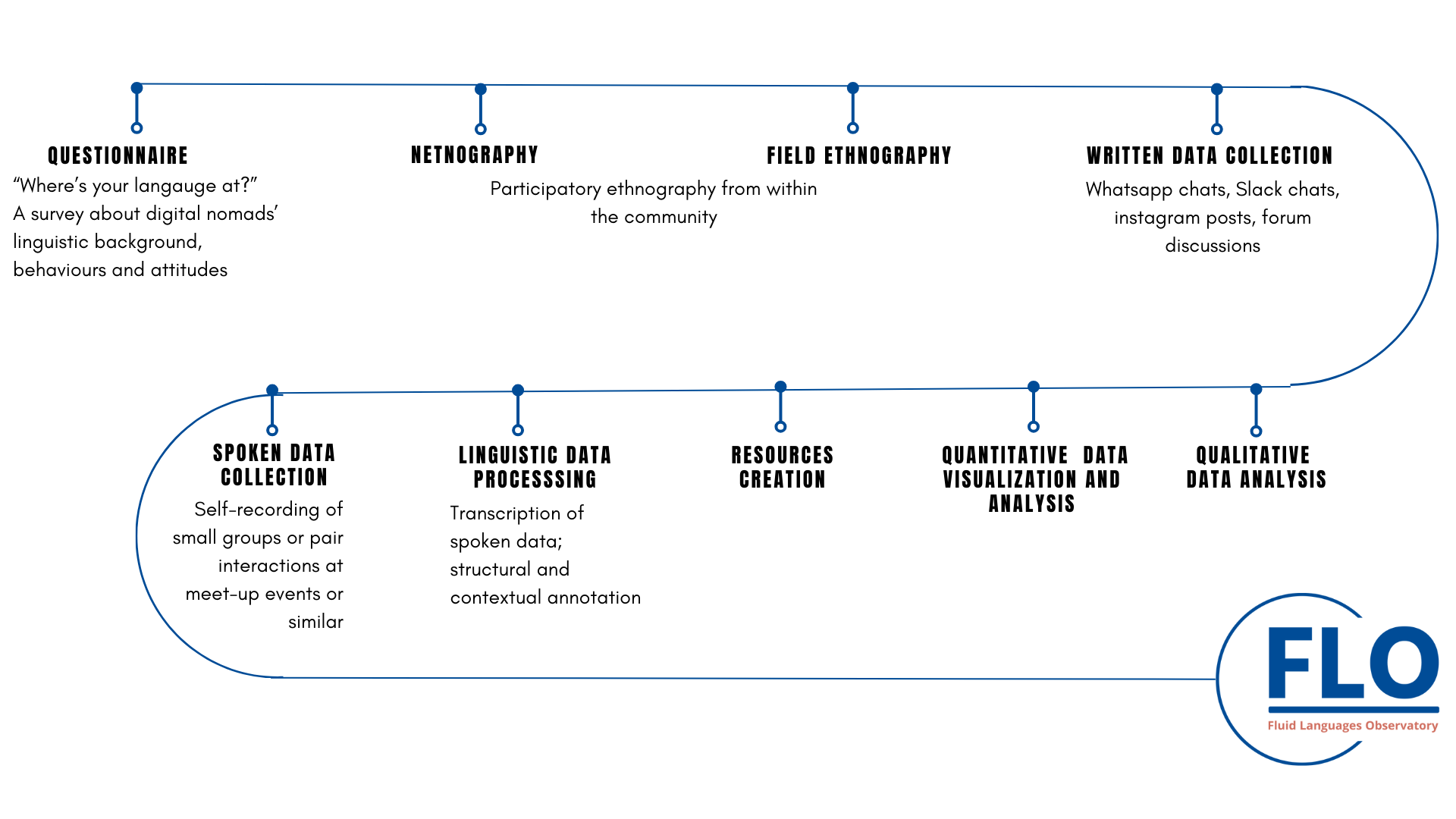Speak your language, make the world hear your voice!
The European Fluid Languages Observatory
“Some 7 000 languages are spoken globally today. However, half of the world’s population shares just six native languages, and some 90% of all languages may be replaced by dominant ones by the end of the century. The harmonious co-existence of 24 official languages is one of the most distinctive features of the European project. Multilingualism is an expression of the EU countries’ cultural identities.”
(European Parliement Briefing on Multilingualism in Europe, 2019)
WHAT IS FLO?
FLO, The European Fluid Languages Observatory, is a project which aims at bringing together research, documentation, practices about cultural and linguistic fluidity.
In the era of digital transformation, unprecedented migratory flows and mobility, super-diversity has become the essence of today’s society. As fundamental elements in cultural and social processes, languages are our primary means of communication with the world, they are at the basis of community building: languages represent who we are. And, in the ever-changing liquid reality which we all are living our languages assume a fluid shape, they change along with the people we meet, the place where we live, the books we read, the films we watch, the networks we are part of, and the experiences we make.
And, as linguists, Languages are the perspective we have chosen to try and understand the great and fast changes which our society is undergoing.
HOW DID IT ALL BEGIN?
In 2019, the University of Bologna has lunched several Departmental Development Strategic Projects, which encompassed the activation of Ph.D. scholarships aimed at enhancing interdisciplinary research on the topics of digital transformation and multiculturalism. In this framework, the Department of Translation and Interpreting has offered a Ph.D. program on linguistic and cultural fluidity, focused on the study of language and communication in the era of post-globalization, -multilingualism and digitalisation.
In 2022 the Ph.D. scholarship for this project was won by Novella Tedesco, who proposed a research on language fluidity in the context of European digital nomadism. The research has thus started with the reconceptualization and theoretical systematization of what was an initial evanescent idea into a concrete research topic, analyzable with qualitative and quantitative research tools. At the same time, a thorough review of scientific literature, books, blog articles, marketing campaigns and forum discussions was carried out to understand and characterize the population under study: the European digital nomads. In the first semester of 2023 ethnographic research and the emerging method called netnography were also employed to get a closer deeper glimpse of the phenomenon.
At the moment, FLO is carrying out research at the University of Bologna, in Italy, at the University of Madeira, in Portugal, and at the University of Gran Canaria, in Spain. Its activity now follows a detailed and structured methodological protocol which mix qualitative and quantitative data to document language fluidity in the European communities of digital nomads.
OUR VISION
We believe that an investigation into the use of English as a lingua franca as well as more innovative practices of intercultural plurilingual communication such as translanguaging and intercomprehension can become a powerful resource at both an institutional, a social and an educational level. We are also committed to engage with up-to-date scientific methods by fully embracing the digital shift in humanities, which also encompasses data-intensive research. At the same time, our project entails a very human and interpretative perspective, adopting a grounded and participatory approach in all the research steps.
Among the outputs which the Observatory aims to produce, the most important ones are statistics about digital nomads’ educational and language background, about their linguistic behaviours and attitudes in communicative contexts characterized by intense multiculturality and plurilingualism, and real language data collected from informal social events and social network chats, organised in the form of open-access FAIR computer-readable text data. These will be – in our view – important documents for the institutional planning of education, language and tourism policies in many European countries, among the many other applications we envisage.
A SOUND METHODOLOGICAL PROTOCOL
PEOPLE
The person writing all of this is Novella Tedesco a.k.a. the Nomad linguist. And I am not alone in my research. First and foremost, I can benefit from the inspiring guidance of my Ph.D. supervisors, Prof. Silvia Bernardini and Prof. Cristiana Cervini. While getting all the support I need from the board and faculty members of the Ph.D. programme in Translation, Interpreting and Intercultural Studies at the University of Bologna, I also receive constant feedback and inspiring ideas by the continuous COLITEC meetings and seminars.
Moreover, the research project is hosted abroad by the University of Madeira, in the person of Prof. Maria Helena Rebelo from September until December 2023, and by the University of Las Palmas de Gran Canaria from January to May 2024 under the supervision of Prof. Gisela Marcelo Wirnitzer at the the University of Gran Canaria. The data are being processed and analysed also under the supervision of Prof. Benedikt Szmrecsanyi at KU Leuven (Belgium).
